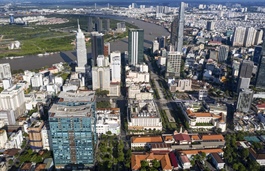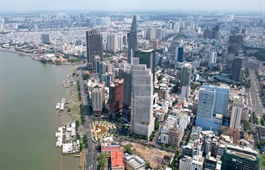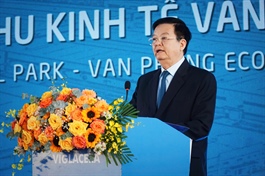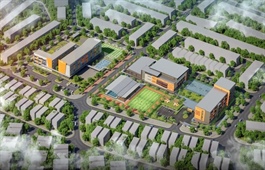Hopes endure for real estate optimism
Hopes endure for real estate optimism
There had been heightened optimism among investors when it comes to Vietnam’s real estate sector this year – but a spanner now may be in the works in the form of new and heavy US tariffs.
The unexpected decision of the United States to impose strict tariffs on Vietnamese exports to the US will likely have a knock-on effect on the country’s recovering real estate sector.
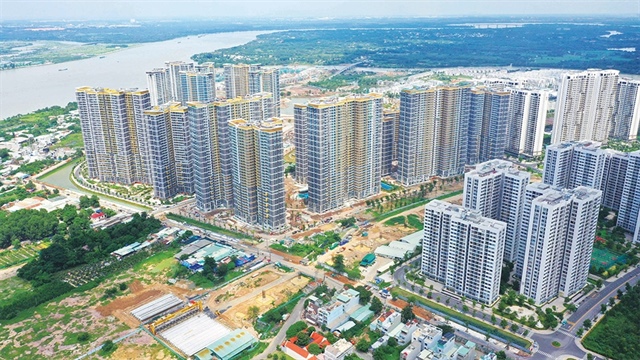
Hopes endure for real estate optimism, Photo: Le Toan |
Dinh Minh Tuan, southern regional director for property website Batdongsan.com.vn, said that if the US tariffs are implemented on April 9 (see Pages 2-3), Vietnam may experience a decrease in foreign investment inflows, which may reduce the liquidity of the real estate market in the mid-range and low-end segments.
“There will be a risk that the demand for buying and renting houses by foreigners will decrease respectively,” Tuan said.
In addition, under the pressure of controlling inflation and exchange rates, homebuyers will have difficulty repaying their debts, leading to a drop in purchasing power, especially in the mid-range segment.
“The negative sentiment from the US will also cause the real estate market to freeze temporarily, the severity of which will depend on Vietnam’s ability to respond and the development of global trade policies,” Tuan added. “The real estate segments that will be greatly affected are mid-range real estate, industrial real estate, and possibly resorts.”
Before the US unveiled its plans for global economic upheaval last week, developers and investors in Vietnam had been bullish when it came to new projects thanks to a recently strengthened legal system, favourable economic indicators, and overall heightened optimism.
Major housing group Vinhomes plans to launch at least four new projects for sale this year: Apollo City in Quang Ninh province, Wonder City in Hanoi, Phuoc Vinh Tay in Long An province, and Duong Kinh in Haiphong city.
The group is also set to sell more developments in the new urban area Duc Hoa-Hau Nghia in the Mekong Delta province of Long An.
According to a report released by ACB Securities in March, Vinhomes’s Wonder City and Phuoc Vinh Tay may respectively contribute 20 and 12 per cent to Vinhomes 2025 sales contract value, expected at $3.7 billion.
Dat Xanh Group will restart Gem Riverside in Ho Chi Minh City later this year. Vietcombank Securities in a mid-March report said that the selling price level of Gem Riverside would be positive, at $4,400-4,800 per square metre, helping to bring in a cash flow of about over $1 billion over the next few years.
In parallel, Dat Xanh will also open the next subdivisions at Gem Sky World in Dong Nai province. Following 800 land plots sold in the Sapphire Parkview subdivision since 2024, Dat Xanh will launch around 400 more plots in 2025.
Meanwhile, Novaland also expects to earn a profit of $56 million this year thanks to the handover of more than 3,000 real estate products.
In addition to Aqua City, NovaWorld Phan Thiet, and NovaWorld Ho Tram, with legal progress to resume construction and sales this year, Novaland plans to open two other new complexes in Ho Chi Minh City: Park Avenue and Palm City.
New advances
Meanwhile, the Ministry of Construction has been studying international experience and reviewing regulations on the establishment of a National Housing Fund to develop low-cost housing in large cities.
According to real estate expert Dang Hung Vo, the fund will focus on supporting businesses and individuals through credit and tax policies.
“The state only plays a management role in this fund to regulate and ensure fairness in accordance with market mechanisms and the law of supply and demand. The state supports planning, land allocation, site clearance, and price regulation. Businesses and investors will be offered financial support to reduce pressure on project implementation. Thus, implementation will be faster, reducing investment costs, thereby reducing pressure on home prices,” said Vo.
Moreover, the Ministry of Finance has proposed to continue applying a 30 per cent reduction in land rent for 2025. This policy is a significant financial support measure that helps ease cost pressures for real estate businesses, particularly those leasing land from the state for development.
Prime Minister Pham Minh Chinh asked the State Bank of Vietnam and commercial banks to study preferential credit packages to develop housing for young people, while the Real Estate Association proposed applying an annual interest rate of 6-7 per cent for young people buying homes for the first time.
According to Duong Duc Hieu, director and senior analyst at Vietnam Investors Service, said that despite improvements in revenue recognition and cash resources, developer profitability and operating cash flow continued to deteriorate in 2024.
“However, we view 2025 as a year of stronger operating performance for developers. New housing supply from extensive developments since in the second half of last year, buoyed by robust homebuyer sentiment, will drive sales and enhance the financial performance of developers in 2025,” Hieu said in a report released in March.
“New policies will boost housing supply and demand in 2025 and beyond. The new Land Law, Housing Law, and Real Estate Business Law, effective since August 2024, along with over 20 guiding circulars and decrees, have accelerated developments and sales,” Hieu added. “The new housing supply will continue improving in 2025 while demand will recover unevenly, with further exuberance in the residential segment and lags in the hospitality segment.”
Confidence in the market
According to Michael Glancy, managing director for JLL in Thailand, Indonesia, Philippines, and Vietnam, the latter remains one of the fastest growing economies in Asia.
“As Vietnam’s property market enters a new chapter of economic growth, JLL remains optimistic about investment prospects for 2025, highlighting rising deal flows, resilient fundamentals, and ongoing regulatory enhancements as key drivers of growth. Vietnam’s real estate market is showing clear signs of strengthening, and we anticipate a significant uptick in investment activity as we progress through 2025,” said Glancy in JLL’s Vietnam Property Market Outlook 2025 report.
“The easing of borrowing costs and a notable boost in investor confidence are key drivers behind this positive trend. Vietnam’s fundamental strengths continue to make it an attractive destination for real estate investment across a range of sectors. As market conditions continue to improve, we expect to see a surge in transactions and development projects, reinforcing Vietnam’s position as a prime market for real estate opportunities in Southeast Asia,” he added.
After record-low supply levels in 2024, Vietnam’s residential sector is set for a resurgence, fuelled by new regulatory amendments that are improving transparency and approval processes. Developers and investors have historically focused on Hanoi, Ho Chi Minh City and increasingly on satellite areas, where demand is expected to pick up.
“The market is embarking upon a healthier cycle, supported by a combination of urbanisation, a growing middle class, and regulatory improvements. We anticipate stronger sales in well-planned residential projects, especially mid-to-high-end segments,” said Le Trang, country head of JLL Vietnam.
“Vietnam remains a top Southeast Asian destination for manufacturing, leveraging its strategic location. The country benefits from evolving local regulations, global shifts, and ambitious infrastructure development, making it increasingly attractive for industrial and logistics investments,” Trang added. “Vietnam remains one of the fastest growing economies in Asia. Disbursed foreign investment capital are expected to reach $25.4 billion by 2024, up 9.4 per cent on-year, with major infrastructure driving the development of real estate hotspots across the country.”
|
Marc Townsend, senior advisor Arcadia Consulting (Singapore) I think it’s a bit too early to say what the long-term effects will be for the US tariff changes, but it’s certainly a huge wake-up call for the Vietnamese government and wider real estate market, especially the nascent industrial sector. However, the industrial sector will almost certainly stall and possibly falter until there is more certainty with the ongoing negotiations. The wider real estate market was recovering well from a couple of years of low supply in Ho Chi Minh City and Hanoi; too much inventory and speculation in the second home sector in Danang, Nha Trang, and Phu Quoc; and the ongoing anti-corruption drive, low levels of confidence, and higher interest rates. This year also started well with new government policy and laws regarding the real estate market, improving infrastructure, and a widening of the manufacturing base prompting the government to forecast 8 per cent GDP growth. This will be a more challenging proposition but, with Vietnam’s well-oiled diplomacy skills and the whole world now wearing sneakers that are made in Vietnam, not an impossibility. Peter Ryder, executive chairman Indochina Capital The large US reciprocal tariffs on Vietnam will definitely impact the real estate market, as its growth is dependent on GDP growth. As of 2023, exports to the US accounted for nearly 30 per cent of Vietnam’s GDP. Thus, if the new tariffs are implemented, Vietnam’s GDP will be considerably affected, and this will in turn affect real estate growth. Meanwhile, the manufacturing sector is at the heart of Vietnam’s economy and has been primarily responsible for its impressive growth over the years. If these tariffs stand, the government’s growth target of 8 per cent in 2025 will no longer be feasible. With a depressed local, regional, and global economy, all of Vietnam’s economic sectors, including real estate, will be adversely affected. For the industrial market, Indochina Capital has discussed this matter with some of its tenants at Core5 Vietnam, and all players understand the level of uncertainty surrounding this issue. This tariff rate will not only affect leasing and releasing at all industrial properties across the country, but foreign investors will also think twice before committing their capital to Vietnam. |
- 09:13 11/04/2025




